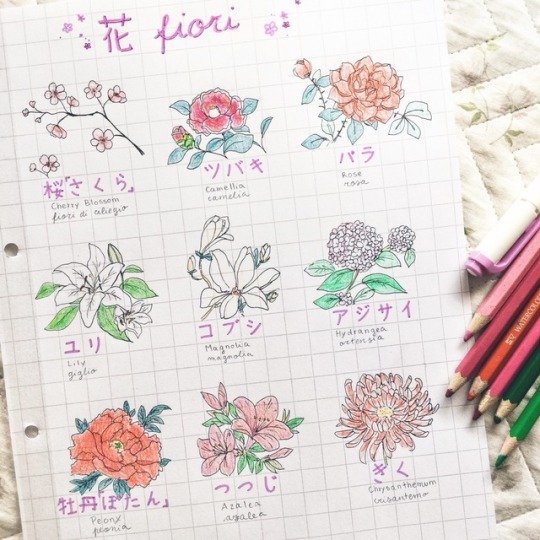Nicole's studyblr and langblr! | 18 |Sagittarius 🏹| Architecture major Pianist | Artist | En/Pt/Es
Don't wanna be here? Send us removal request.
Text
9 points about language learning and how I’m learning 20+ of them
I’ve had a few requests to write about how I learn my languages. To different degrees, there’s currently 20+ of them and I don’t see myself stopping yet. The thing is, learning languages comes really easily to me and I want to share, maybe it will be helpful to somebody else.
First, I’d like to have a look at first versus second language acquisition. I’m a linguist and I’m super interested in Child Language Acquisition. That however, has a critical age of 14 (or so I was always told) and is then no longer possible and any language learned after that age will never progress as quickly or can’t be learned perfectly. Well. I disagree. The simple difference is - first language acquisition is how you acquired your first language(s) as a child. By imitating, finding patterns, etc. Second language acquisition is what you know from language courses. Vocabulary, irregular verb tables, endless exercises. Now that we got some of the terminology off the table, let me see how I actually learn languages: 1) I utilise elements of the first language acquisition rather than second language I’ve only studied vocab a couple times at school, when I put them into Quizlet or when someone forced me to. I’ll get back to it in another point. I don’t learn patterns. I know there is one and I let the input do its magic of slithering into my head. Again, more on that in point 2. You always get told you’ll learn a language better when you’re thrown into the country where they speak it. And it’s so true because of the processes behind it. Because input and immersion are the keys and that’s how children learn, too.
2) I don’t cram languages. I process them.
Around langblrs, I keep seeing all the ‘crying over verb tables’, ‘trying to learn a 1000 words this week’ and the like. That may work for you, sure. But I’ve never done that. I did learn a few irregular verb patterns for German in class, but while I could recite them, it wasn’t helpful. In Irish, I sometimes still wonder which verb ‘An ndeachaigh tú?’ comes from. The thing is, you’re able to process language. You know this word is probably irregular. If you come across it and don’t know what the irregular form is, look it up. After you’ve looked it up for the tenth time, you’ll probably remember by then. Same with anything else. Don’t try to learn things by heart when it comes to languages. 3) Vocab?? Same rule applies here. I’ve only learned vocab at school and then a handful of times when I wasn’t too lazy to put it into Quizlet (which is fun and I learn something, but it’s more of a useful pastime than anything). When you read, just skip the words you don’t know and only really look them up if you can’t tell by context. NEVER translate vocabulary. I mean, sure, look up what it means, but don’t connect it to the word itself. Connect it to the meaning. Pictures work better. As for abstract words, imagine the concept. Just try not to bridge the meaning of the word with your native language. Languages in your brain are meant to be two separate units. Unless you’re working on a translation piece, they shouldn’t be ‘touching’. 4) I use example sentences for everything.
Grammar guides are useful but rather than learning all the rules at once, take it one step at a time and remember some example sentences and let them guide you through the grammar rule you need.
5) Input is everything. Output is hard, but you’re basically imitating input and utilizing patterns you know (or think you know). Let me give you an example. Let’s say I’m writing a piece on my daily routine, for example. I make use of the example sentences and try to tailor them to my own needs. Trial and error, if I make a mistake, it’s okay, if somebody points it out, I probably won’t make it next time. As I progress, I will gradually remove the mistake. Same goes to new words and new verbs. Use the input you’ve got. Does this verb sound like some other verb you’ve heard before? It’s might have a similar conjugation pattern. You can check it, you don’t have to.
6) Learning languages should NOT be stressful! I never stressed over learning a language. Sure, I’m frustrated that after a year and a half of learning Irish, I’m not 100% fluent, but I’ve never stressed over it. I’ve never cried over it. I’ve never cried over a language (I only cried after a French oral exam which I thought I failed). Don’t be hard on yourself and try learning through a method that’s not stressful. Watch videos for children. Read books for children. Write down cool things in your target language(s). 7) You’ve learned a language before. Why wouldn’t you be able to learn it now in a very similar way? This is basically me saying that I have little belief in the efficiency of pure second language acquisition. Maybe a few individuals can reach fluency by cramming a language, the thing is, I think that if we concentrate on processing instead of remembering, just like we did when we were children, we can reach better results in a shorter amount of time. Also, if this is your third or fourth language, compare to languages you already know. 8) I don’t start with basics. I start ‘somewhere’.
Delve into the language the second you’ve started. Are you overwhelmed? That’s fine! You’ll find your way around it. Start with word meanings, finding out what kind of sentences those are and then build your way around it. Don’t start saying ‘hello’ and ‘I’m from’. Those are cool, but usually, they are used in a different way when you actually go out and speak. You’ll get them along the way.
9) Don’t rely on instructions (only). Rely on yourself.
This is just my two cents. I’ve pieced this together trying to remember how I’ve learned what I’ve learned and comparing it to how others around me learned. Please, let me know if it makes any sense. I may edit this and post this again later if I have any more ideas. Feel free to contribute or to bombard me with questions. I’m happy to answer.
10K notes
·
View notes
Text
ITALIAN EXPRESSIONS
Raga - short for “ragazzi”; literally: “guys” (probably the most used)
Dai - it can be translated to “come on” and it’s pronounced like the English word “die” (so yeah it can create a little bit of misunderstanding)
Meno Male! - literally “less bad!”; but it means “thank God!”
Magari! - literally “maybe”; it’s the italian equivalent of “I wish!”
Basta - it means “that’s enough” “stop it” “enough”
Boh - literally this emoji: ¯\_(ツ)_/¯ or “to have no clue”. (“Did we have homework for today” “boh”)
Quattro gatti - literally “four cats”; it means very few people. (Alla festa eravamo in quattro gatti - at the party we were in four cats)
Come Dio comanda - literally “as God commands”; something done properly, like it should be.
Spettegolare - to gossip
Toccare ferro - literally “to touch iron”; italian equivalent for “knock on wood” (yeah we touch iron instead)
alzare il gomito - literally: “to raise the elbow”; to drink too much (if someone raised the elbow he drank more than he should have)
Siga - short for “sigaretta” which means cigarette (would be “ciga” in English? Did I just invented a new slang word? Idk)
Ci sta - literally: “it fits” it means “that’s cool” “sounds good”
Fatti furbo - literally: “make yourself smart”; it means something like “wake up!” “open your eyes!”
Un limone - literally: “a lemon”; it’s a make out session
10K notes
·
View notes
Photo


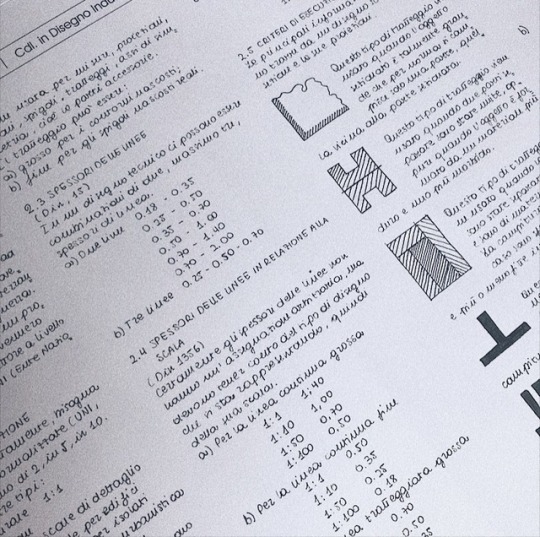
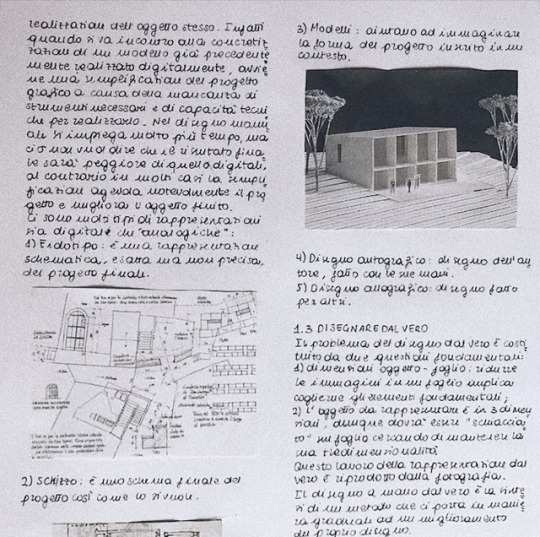
5.02.2018 •• currently preparing my design book for next week’s exam, hoping for the best 🤞🏼
2K notes
·
View notes
Text
How to learn a language fast
1. Learn a sizable vocabulary, there is a good list of 625 words you should know in your target language. Spend time building this up and be sure to practice your pronunciation that is vital. To learn vocabulary there are many methods: flashcards, lists, apps, mindmaps etc. I personally use the app Quizlet as it has many learning tools and flashcards so you can practice on the go.
2. Learn basic grammar, for this you can use a book or there are plenty of websites online that will have resources. You just need to have master a section at a time so you have the basic learnt.
3. Listen to the spoken language, if you are in the country awesome but chances you are not so some ways to this are: listening to audio files, using apps (I know Duolingo has a aspect that reads stories), watch YouTube videos in that language, watch films and listen to the radio (there are lots of streams online).
4. Practice speaking, pronunciation is vital plus saying things over and over again can help move it to the long term memory. It will make you feel much more confident in your abilities. To practice speaking it would be ideal to find someone who is fluent in your target language but if not there are speaking exercises online, you could try read a book out loud or even learn a song.
5. Stick to it, this is probably the most important part if you don’t keep practicing regularly you will forget it all. Even if it is just something small it is better than nothing and will be worth it when you can speak a whole new language.
Good Websites
BBC Languages
Duolingo
Dictionaries
Quizlet
Memrise
Babbel
Fluent Forever
Feel free to add more helpful tips, tricks etc below.
I’m going to learn Spanish.
2K notes
·
View notes
Text
feel free to follow my architecture sideblog @frozenmusics 💒💕
0 notes
Text
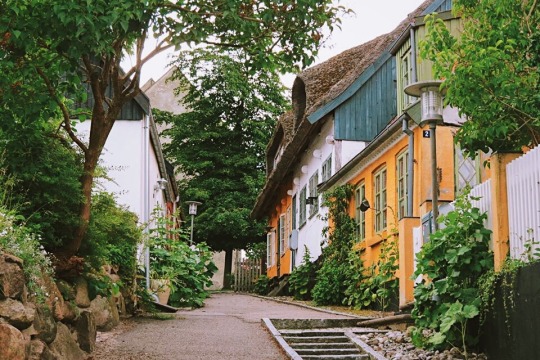
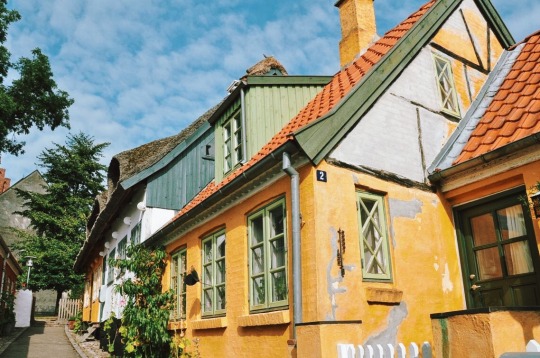
I grew up on the cutest street.
Roskilde, Denmark 🇩🇰
506 notes
·
View notes
Text


sweet Iris and the hazy pink glow of early mornings
6K notes
·
View notes
Text
🎨art-related words in Polish🎨
Art- sztuka (f) Artfulness- artyzm (m) Painting- malarstwo (n) Sculpture- rzeźba (f) Designing- projektowanie (n) Fashion- moda (f) Drawing- rysowanie (n) Sketching- szkicowanie (n) Still life- martwa natura (f) lit.“dead nature” Print making- druk artystyczny(m) or grafika warsztatowa(f) Mosaic- mozaika (f) Woodcutting- rzeźbienie w drewnie (n) Knitting- tkanie (n) Photography- fotografia (f)
Paint- farba (f) Watercolour- akwarela (f) Oil paint- farba olejna (f), oleje(oils) Acrylic paint- akryl (m) Pencil- ołowek (m) Paintbrush- pędzel (m) Canvas- płótno (n) Easel- sztaluga (f) Ink- tusz (m) Paper- papier (m) Sketchbook- szkicownik (m) Sketch- szkic (m) Medium- medium (n) Tempera- tempera (f) Turpentine- terpentyna (f) Marker- pisak(m) or marker(m) Design or project- projekt (m) Clay- glina (f) Camera- apartat (m)
To paint- malować To draw- rysować To design- projektować To write- pisać To make- robić To sculpt- rzeźbić To build- budować To create- tworzyć To imagine- wyobrażać sobie To colour- kolorować To make up- wymyślić
Artsy- artystyczny Artificial- sztuczny Acrilic- akrylowy Colourful- kolorowy Beautiful- piękny Ugly- brzydki Inspiring- inspirujący Bad- zły Good- dobry Advanced- zaawansowany Beginner- początkujący Photo realistic- fotorealistyczny Realistic- realistyczny
462 notes
·
View notes
Text
Polish swear words - introduction
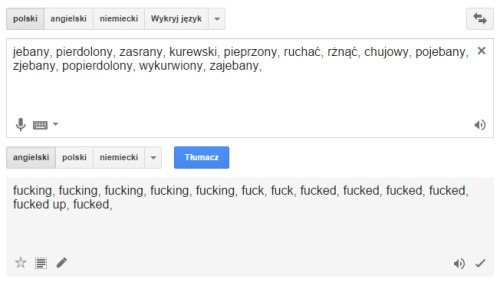
If you ask foreigner to say something in Polish, you’ll probably hear…
Kurwa
Our language is full of swear words and curse words. We’ve got little basic swear words and by adding prefixes, changing cases or using reflexive verbs we can create new one with totally different meaning.
Basic swear words:
kurwa f - whore / fuck
chuj m - dick
pierdolić (impf.) - to fuck
jebać (impf.) - to fuck
Prefixes
If you know basic swear words, you can add a prefix. Let’s take a look at
jebać
:
rozjebać
wyjebać
ojebać
ujebać
odjebać
dojebać
zjebać
podjebać
pojebać
przejebać
wjebać
zajebać
The only synonyms here are wjebać and zajebać (sometimes also wyjebać) - almost every single word means something different.
Cases
Slavic languages are known for system of cases. Using a wrong case can change the meaning of the sentence. Now let’s use a word pierdolić:
pierdolić + acc. (kogo? co?) - to fuck sb / sth pierdolić + dat. (komu? czemu?) - to talk bullshit to sb / sth
Reflexive verbs
Our reflexive verbs contains verb + się (generic reflexive pronoun). I use a word ujebać:
ujebać - to fail or to cut
ujebać się - to get dirty
Notes: I’m going to make posts about these words - how to use them, what case should be used, if it’s possible to create a reflexive verb. Stay tuned!
2K notes
·
View notes
Photo

Awhile ago I told my grandma I’m learning Polish (she was really excited lol) and a few weeks later, recieved this in the mail.
I thought I’d share it with the Langblr community since Polish pronunciation can be difficult, and anyone who’s new to the language might find it useful.
407 notes
·
View notes
Text
Punctuation in Polish ⁉️
spacja (f.) - space
. kropka (f.) - period
, przecinek (m.) - comma
; średnik (m.) - semicolon
: dwukropek (m.) - colon
… wielokropek (m.) - ellipsis
- łącznik (m.) / pauza (f.) - hyphen
— myślnik (m.) - dash
? znak zapytania (m.) / pytajnik (m.) - question mark
! wykrzyknik (m.) - exclamation mark
/ ukośnik (m.) - slash
() nawias (m.) - round bracket / parentheses
’ apostrof (m.) - apostrophe
“ cudzysłów (m.) - quotation marks
@ małpa (f.) - at sign
* gwiazdka (f.) - asterisk
× znak mnożenia (m.) - multiplication sign
- znak odejmowania (m.) - minus sign
+ znak dodawania (m.) - plus sign
÷ znak dzielenia (m.) - obelus
= równik (m.) / znak równości (m.) - equals sign
% procent (m.) - percent sign
§ paragraf (m.) - section sign
_ podkreślenie (m.) / podkreślnik (m.) - underscore
___
inspired by this post
431 notes
·
View notes
Text
Cozy vocab in Polish
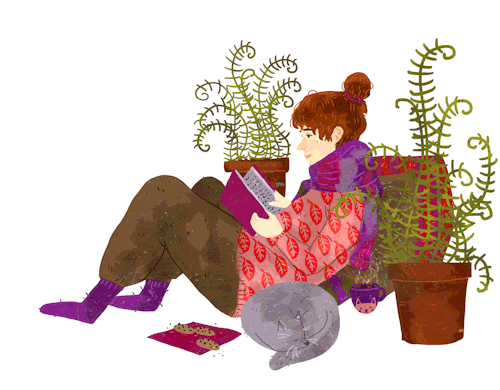
Translation of @malteseboy‘s amazing cozy vocab list in Maltese! :)
całus, pocałunek - kiss film - movie przytulasy - cuddles sweter - sweater poduszka - pillow kawa - coffee skarpety, skarpetki - socks książka - book komfort, wygoda - comfort koc - blanket drzemka - nap kominek - fireplace kot - cat ciepło - warmth gwiazdy - stars herbata - tea uścisk - hug świeca, świeczka - candle
miękki - soft delikatny - delicate słodki - sweet komfortowy, wygodny - comfortable ciepły - warm
całować, pocałować - to kiss przytulać, przytulić or ściskać, uścisnąć - to hug dbać, zadbać o kogoś or opiekować się, zaopiekować się kimś - to take care of sb kłaść się, położyć się - to lie down tulić or tulić się - to cuddle czytać, przeczytać - to read spać - to sleep odpoczywać, odpocząć - to rest
940 notes
·
View notes
Text
Hair Vocabulary in Polish 🎀

włos (m.) [pl.: włosy] - hair*
peruka (f.) - wig
gumka (f.) - elastic
spinka (f.) - hair-slide
szczotka (f.) - hairbrush
grzebień (m.) - comb
szampon (m.) - shampoo
odżywka (f.) - conditioner
żel do włosów (m.) - hair gel
sprej do włosów (m.) - hairspray
wstążka (f.) - ribbon
kokarda (f.) - bowknot
farba do włosów (f.) - hair dye
fryzura (f.) - hairstyle
grzywka (f.) - bangs
przedziałek (m.) - part
kok (m.) - bun
kucyk/koński ogon (m.) - ponytail
warkocz (m.) - braid
dobierany (m.) - French braid
afro (n.) - afro
dred (m.) [pl.: dredy] - dreadlock*
irokez (m.) - mohawk
myć (włosy) - to wash your hair
czesać - to comb your hair
szczotkować - to brush your hair
rozczesywać - to detangle (usually using a brush/comb)
rozplątywać - to untangle (usually using your fingers)
plątać - to tangle
zaplatać/pleść - to braid
obcinać - to cut
zapuszczać - to grow hair
spinać/upinać - to pin up
farbować - to dye
the adjectives below are in their feminine plural form (so the way you’d use them with “włosy”):
kręcone - curly
proste - straight
falowane - wavy
poplątane - tangled
rozpuszczone - let down
spięte/upięte - pinned up
siwe - gray
brązowe - brown
rude - red
czarne - black
blond - blond
farbowane - dyed
man, female
brunet, brunetka - brunet, brunette**
blondyn, blondynka - blond
rudzielec (not very polite) - redhead
szatyn, szatynka - dark-haired man, dark-haired woman**
fryzjer, fryzjerka - hairdresser
*most often, you’ll see these words in their plural forms but they’re not interchangeable with their singulars (they exist both in their plural and singular forms and are used accordingly).
**the difference between “brunet” and “szatyn” (and their feminine counterparts) is that “brunet” is technically a man with black or very dark brown hair, while “szatyn” is just “normal” brown. It’s just a technical point of view, though — in everyday Polish, there’s not much of a difference; people rarely use “szatyn”.
__________
photo’s source
569 notes
·
View notes
Text
In Polish we can say “Don’t bother me” in a few ways. One of them is “Nie zawracaj mi gitary” which roughly translates to “Don’t bother my guitar” and that’s truely beautiul.
Submitted by @dioxazinne
846 notes
·
View notes
Text
Longest words
These are some of the supposed longest words in different European languages:
Irish - “rianghrafadóireachta” - photography
French - “Anticonstitutionnellement” - unconstitutionally
Croatian - “Prijestolonasljednikovica” - wife of an heir to the throne
Greek - “ηλεκτροεγκεφαλογραφήματος” - of an electroencephalogram
Latvian - “Pretpulksteņrādītājvirziens” - counter-clockwise
English - “Antidisestablishmentarianism” - against the disestablishment of the Church of England
Swedish - “Realisationsvinstbeskattning” - capital gains tax
Czech - “Nejneobhospodařovávatelnějšímu” - to the least cultivable ones
Polish - “Konstantynopolitańczykowianeczka” the daughter of a man from Constantinople
Norwegian - “Menneskerettighetsorganisasjonene” - the human rights organisations
Lithuanian - “Nebeprisikiškiakopūsteliaujantiesiems” - people who no longer are able to pick up wood sorrels.
Ukranian - “Нікотинамідаденіндинуклеотидфосфат” - nicotinamide adenine dinucleotide phosphate
Serbian - “Семпаравиливичинаверсаламилитипиковски” - (this is actually the last name of a family from Yugoslavia)
Portuguese - “Pneumoultramicroscopicossilicovulcanoconiotico” - a disease caused by breathing in the dust from a volcano
Welsh - “Llanfairpwllgwyngyllgogerychwyrndrobwllllantysiliogogogoch” - St Mary’s Church in the Hollow of the White Hazel near a Rapid Whirlpool and the Church of St. Tysilio near the Red Cave
Agglutinative languages. Things get even weirder here:
Estonian - “Sünnipäevanädalalõpupeopärastlõunaväsimus” - the tiredness one feels on the afternoon of the weekend birthday party
Dutch - “Hottentottententententoonstellingsterrein” - exhibition ground for Hottentot huts
Hungarian - “Eltöredezettségmentesítőtleníttethetetlenségtelenítőtlenkedhetnétek” - (apparently untranslatable)
Finnish - “Lentokonesuihkuturbiinimoottoriapumekaanikkoaliupseerioppilas” - (something to do with the Finnish Air Force. Hard to translate but impressively long)
Icelandic - “Vaðlaheiðarvegavinnuverkfærageymsluskúraútidyralyklakippuhringur” - key ring of the key chain of the outer door to the storage tool shed of the road workers on the Vaðlaheiði plateau (Icelandic isn’t even really an agglutinative language which makes this even more impressive)
Turkish - “Muvaffakiyetsizleştiricileştiriveremeyebileceklerimizdenmişsinizcesine” - as though you are from those we may not be able to easily make a number of unsuccessful ones
And then the longest word is, of course, German. It’s 79 letters long and almost impossible to use in context:
German - “Donaudampfschiffahrtselektrizitätenhauptbetriebswerk-bauunterbeamtengesellschaft” - Association for subordinate officials of the head office management of the Danube steamboat electrical services.
If you know any more impressively long words that I missed, please let me know so I can add them!
8K notes
·
View notes
